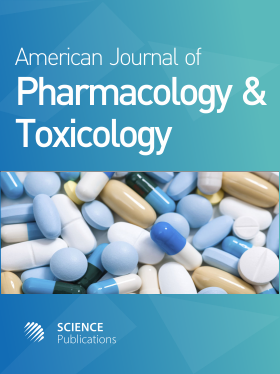Mutagenic Screening of Crude Oil Fractions Using Modified Ames Test and Allium cepa (Linn) Assay
- 1 University of Lagos, Nigeria
- 2 Nigeria Institute of Medical Research, Nigeria
Abstract
Problem statement: Crude oil which may be broadly characterized as paraffinic or naphthenic is a complex mixture of alkanes, cycloalkanes and aromatic hydrocarbons. About 500,000 workers are employed in crude oil exploration and production worldwide. There have been reports of occupational exposure during drilling, pumping and transportation of crude oil, including maintenance of equipment used for these processes. Thus, skin tumors have been reported in mice after repeated application of the east Wilmington crude oil to their skin. Approach: It may thus be necessary to investigate the mutagenic potentials of crude oil fractions using a modified Ames test and internationally accepted Allium cepa (Linn) assay. The Allium cepa assay was done to determine the mean root length, mitotic index and chromosomal aberrations of the onions root grown in various concentrations of 5, 10 and 15% v/v crude oil, petrol, kerosene, engine oil and diesel in water. The modified Ames test which is a modification of the standard Ames test was done using E. coli (0157: H7) that has the phenotypic characteristics of glucose and lactose fermentation, motile, urease negative, indole positive and citrate negative. Thus the alteration in normal biochemical characteristics was determined by inoculating the revertant strains produced by the organism after incubating with the crude oil fractions into the specified media to re-determine their biochemical characteristics. Results: The results obtained from the Allium cepa assay showed increasing root growth inhibition with increased concentration and decreasing mitotic index with increased concentration. Stickiness, Vagrant, Bridges and fragments, Bi-nuclei, C-mitosis, multi polar anaphase and anaphase with laggards chromosomal aberration were observed. The modified Ames test showed a remarkable alteration in the biochemical characteristics of E. coli (0157: H7) by petrol and engine oil indicating mutagenicity. Conclusion: The results of the Ames test showed petrol and engine oil to demonstrate mutagenicity in bacteria, while, the Allium cepa assay showed mitodepressive effects of crude oil, petrol, engine oil, diesel and kerosene.
DOI: https://doi.org/10.3844/ajptsp.2010.1.8

- 5,779 Views
- 4,813 Downloads
- 4 Citations
Download
Keywords
- Crude oil
- mutagenicity
- Ames test
- Allium cepa
- E. coli
